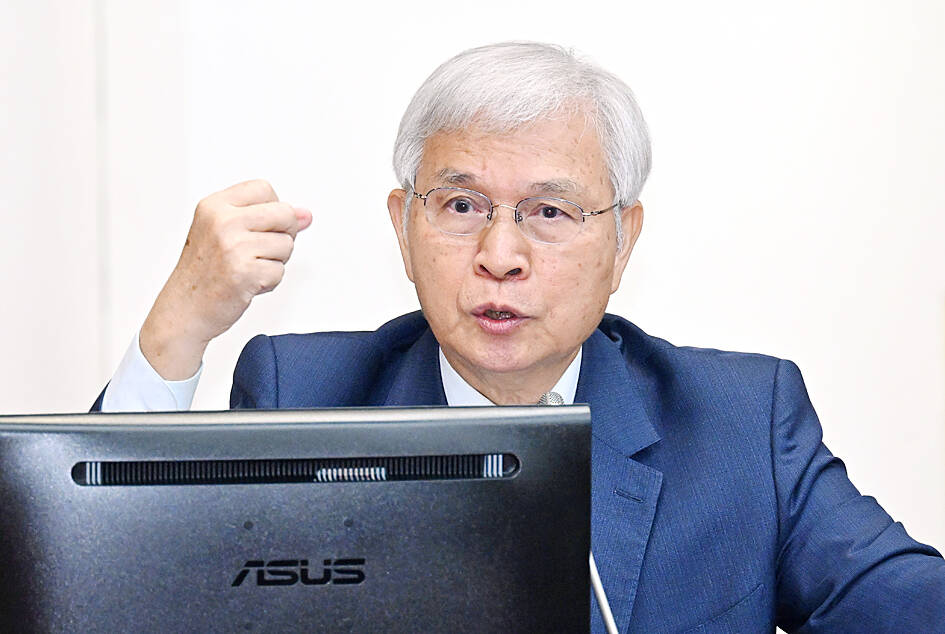Central bank Governor Yang Chin-long (楊金龍) yesterday indicated that inflation is becoming less of a concern for Taiwan’s economy, comments that come a week before a key decision on interest rates by the monetary policymaker and also ahead of the Directorate-General of Budget, Accounting and Statistics (DGBAS) releasing inflation data for last month.
The consumer price index (CPI) last month rose 2.24 percent from a year earlier, accelerating from a revised 1.94 percent increase in April, the DGBAS reported yesterday.
“CPI, core CPI, important staples prices and prices of commonly purchased items are gradually falling,” Yang told lawmakers during a regular question-and-answer session at a meeting of the Finance Committee at the legislature in Taipei. “The economy is recovering, but it’s not very strong.”

Photo: Liao Chen-hui, Taipei Times
The central bank would take into account global monetary policy conditions when it sets interest rates, Yang said.
Those remarks came as Canada took the lead in G7 nations cutting rates.
Taiwan’s interest-rate swaps (IRS) — a measure of trader expectations for rate hikes — fell after Yang’s remarks.
The three-year IRS dropped as much as 5.5 basis points, the most since late March.
In March, the central bank unexpectedly raised its benchmark interest rate to the highest since 2008.
Yang said at the time that “inflation has been high since 2021” and singled out concern over electricity costs.
Asked by lawmakers if the central bank would make yet another surprise next week, Yang yesterday said: “It’s not good to give surprises from time to time,” remarks that seemed to imply that the central bank might stay put this time.
Lawmakers also asked Yang if the central bank would raise rates or further tighten credit control measures for real-estate financing to battle rising housing prices.
Yang said that interest rates would not be used to influence property prices and that central bank board members would look into the property issue at a quarterly policymaking meeting on Thursday next week.
Climbing home prices are a lingering concern.
Earlier this week, the Chinese-language Commercial Times reported that some commercial lenders think the central bank might tighten mortgage lending rules at next week’s meeting.
The central bank has introduced several rounds of selective credit controls on local banks since December 2020 to cool the property market and rein in rising housing prices.
While Taiwan expects the economy to grow this year at the fastest pace since 2021, inflation has been a key concern for policymakers and the public.
Although the pace of price gains has been low compared with elsewhere in the world, even slower wage gains has meant the erosion of household earnings.
Last week, the DGBAS upgraded its GDP and CPI growth estimates for this year to 3.94 percent and 2.07 percent respectively, up from 3.43 percent and 1.85 percent it projected earlier.
The bank is expected to adjust upward its economic growth and inflation forecast next week as well.

Nvidia Corp chief executive officer Jensen Huang (黃仁勳) on Monday introduced the company’s latest supercomputer platform, featuring six new chips made by Taiwan Semiconductor Manufacturing Co (TSMC, 台積電), saying that it is now “in full production.” “If Vera Rubin is going to be in time for this year, it must be in production by now, and so, today I can tell you that Vera Rubin is in full production,” Huang said during his keynote speech at CES in Las Vegas. The rollout of six concurrent chips for Vera Rubin — the company’s next-generation artificial intelligence (AI) computing platform — marks a strategic

Enhanced tax credits that have helped reduce the cost of health insurance for the vast majority of US Affordable Care Act enrollees expired on Jan.1, cementing higher health costs for millions of Americans at the start of the new year. Democrats forced a 43-day US government shutdown over the issue. Moderate Republicans called for a solution to save their political aspirations this year. US President Donald Trump floated a way out, only to back off after conservative backlash. In the end, no one’s efforts were enough to save the subsidies before their expiration date. A US House of Representatives vote

Shares in Taiwan closed at a new high yesterday, the first trading day of the new year, as contract chipmaker Taiwan Semiconductor Manufacturing Co (TSMC, 台積電) continued to break records amid an artificial intelligence (AI) boom, dealers said. The TAIEX closed up 386.21 points, or 1.33 percent, at 29,349.81, with turnover totaling NT$648.844 billion (US$20.65 billion). “Judging from a stronger Taiwan dollar against the US dollar, I think foreign institutional investors returned from the holidays and brought funds into the local market,” Concord Securities Co (康和證券) analyst Kerry Huang (黃志祺) said. “Foreign investors just rebuilt their positions with TSMC as their top target,

REVENUE PERFORMANCE: Cloud and network products, and electronic components saw strong increases, while smart consumer electronics and computing products fell Hon Hai Precision Industry Co (鴻海精密) yesterday posted 26.51 percent quarterly growth in revenue for last quarter to NT$2.6 trillion (US$82.44 billion), the strongest on record for the period and above expectations, but the company forecast a slight revenue dip this quarter due to seasonal factors. On an annual basis, revenue last quarter grew 22.07 percent, the company said. Analysts on average estimated about NT$2.4 trillion increase. Hon Hai, which assembles servers for Nvidia Corp and iPhones for Apple Inc, is expanding its capacity in the US, adding artificial intelligence (AI) server production in Wisconsin and Texas, where it operates established campuses. This